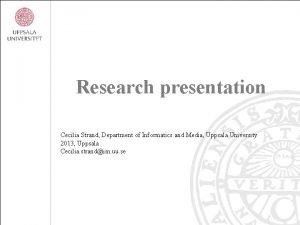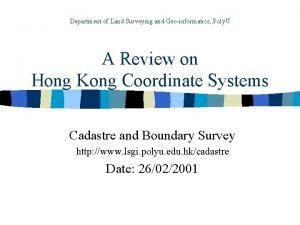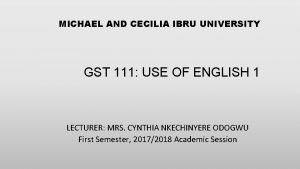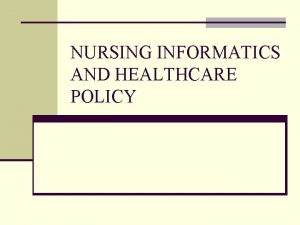Research presentation Cecilia Strand Department of Informatics and










- Slides: 10

Research presentation Cecilia Strand, Department of Informatics and Media, Uppsala University 2013, Uppsala Cecilia. strand@im. uu. se

Perilous Silences and Counterproductive Narratives Pertaining to HIV/AIDS in the Ugandan, Lesotho and Namibian Press by analyzing a society’s mass media and its framing of HIV/AIDS, it is possible to explore what understandings are given preferential treatment in that society, as well as explore what social change those narratives indirectly or directly facilitate. Such an analysis is particularly important in Sub-Saharan Africa, the continent most affected by HIV/AIDS and which has struggled to reverse the course of the epidemic.

5 peer reviewed articles, three case countries • Strand, C. 2010. Fragmented Narratives and Untold Stories: The Portrayal of HIV/AIDS in Lesotho Print Media. • Strand, C. 2010. Factors associated with high media coverage of the HIV epidemic in Lesotho. • Strand, C. 2011. State-sanctioned discrimination and media discourses on homosexuality in Namibia. • Strand, C. 2011. Kill Bill! Ugandan human rights organizations’ attempts to influence the media’s coverage of the Anti-Homosexuality Bill. • Strand, C. (2011). Homophobia as a barrier to comprehensive media coverage of the Ugandan Anti. Homosexual

Theoretical point of departure • Influenced by agenda setting theory • Framing theory • Social constructionism • Our narratives influence which understandings are given preferential treatment in a society, which in turn influence our actions.

Methodological mix • a combination of quantitative and qualitative approaches. • content analysis of independent and governmentcontrolled print media products, • semi-structured interviews with media practitioners and representatives from organizations that seek to influence the media agenda, • as well as document analysis of legislative and policy documents Always a mix of tools to gather data and analytical

Commonalities. Media discourses/narratives on HV/AIDS and/ or sexual minorities in three countries hard-hit by the epidemic –Lesotho, Namibia and Uganda. Discuss the potential effects of persistent silences, as well as narratives that are counterproductive to the countries’ ability to respond to their epidemics.

De-criminalization of vulnerable populations in Sub-Saharan Africa - a study on experiences of violence as a barrier to improved HIV-service uptake Background Strong international focus on de-criminlaization of MSM, IDU and CS to improve HIV/AIDS service uptake In not only Africa but other countries. UN initiative the Global Commission on HIV and the Law 2009 -2012

De-criminalization of vulnerable populations in Sub-Saharan Africa Data material 7 regional dialogues in Africa, Asia, the Caribbean, Eastern Europe, Latin America, Middle East and North Africa, and High Income Countries. Call for submissions generated around approximately 500 written submissions from in total 133 countries.

De-criminalization of vulnerable populations in Sub-Saharan Africa Methodology Open reading highlighted the importance of understanding violence in this context. Coding sheet trying to capture the magnitude and types of violence, and perpetrators of violence, as well as the implications of violence in terms of HIV-service uptake.

De-criminalization of vulnerable populations in Sub-Saharan Africa De-criminalization efforts will not produce the intended results unless the issue of violence experienced by key populations most notably perpetrated by the police are addressed. Human rights campaigners need a more holistic approach as opposed to a atomistic focus in public health campaigns for better services for key vulnerable populations.
 Cecilia strand
Cecilia strand Dispersive model
Dispersive model Template strand, new strand, base pair, and dna polymerase.
Template strand, new strand, base pair, and dna polymerase. Mrna strand that is complementary to the dna strand aattgc
Mrna strand that is complementary to the dna strand aattgc Phosphoanhydride bond
Phosphoanhydride bond Watson strand crick strand
Watson strand crick strand Hk 1980 grid
Hk 1980 grid Gst111
Gst111 Observational health data sciences and informatics
Observational health data sciences and informatics Nursing informatics and healthcare policy
Nursing informatics and healthcare policy Nursing informatics theories, models and frameworks
Nursing informatics theories, models and frameworks



















